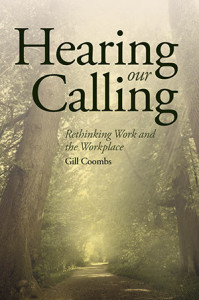New Year, New You: Gill Coombs asks ‘What is a Calling?’
by Floris Books • 23 January 2015 • Alternative Business and Economics • 0 Comments
All through January, here on the Floris Blog we will be celebrating the new. New ways of thinking, new ways of interacting with the world around us, and new ways of living and working meaningfully. New year, new you!
Today, we’re sharing an exclusive extract from Gill Coombs’ Hearing Our Calling. So if you’ve ever wondered, ‘what is a calling, what could it mean for my career?’, then read on…
 Around 400 BC, Plato suggested the idea of archetypes, or universally recognised generic forms. Much later Carl Jung, in his cultural and anthropological studies, described a broad range of archetypes. For Jung, an archetype is an idea held in the world’s ‘collective unconscious’ which expresses itself again and again through time and across cultures. This includes human behaviours, and Jung wrote about archetypal roles such as Warrior and Healer. A lot of material for dreams derives from the collective unconscious. We know this because common themes occur without dreamers having any conscious knowledge of others sharing the theme. One example is the commonly experienced dream of tidal waves, often linked to overwhelming emotions. Themes from the collective unconscious can certainly evolve: car-driving is now a common dream motif, often linked to control (or lack of it) in our lives. Who knows what symbolised this in the pre-car age: riding horses, perhaps? In A Life at Work Thomas Moore advises that ‘dreams will give you hints about the dynamics of your search and about the nature of your calling’. The more attention we pay to our dreams with these questions in mind, perhaps writing them down as we wake, the stronger those hints are likely to become.
Around 400 BC, Plato suggested the idea of archetypes, or universally recognised generic forms. Much later Carl Jung, in his cultural and anthropological studies, described a broad range of archetypes. For Jung, an archetype is an idea held in the world’s ‘collective unconscious’ which expresses itself again and again through time and across cultures. This includes human behaviours, and Jung wrote about archetypal roles such as Warrior and Healer. A lot of material for dreams derives from the collective unconscious. We know this because common themes occur without dreamers having any conscious knowledge of others sharing the theme. One example is the commonly experienced dream of tidal waves, often linked to overwhelming emotions. Themes from the collective unconscious can certainly evolve: car-driving is now a common dream motif, often linked to control (or lack of it) in our lives. Who knows what symbolised this in the pre-car age: riding horses, perhaps? In A Life at Work Thomas Moore advises that ‘dreams will give you hints about the dynamics of your search and about the nature of your calling’. The more attention we pay to our dreams with these questions in mind, perhaps writing them down as we wake, the stronger those hints are likely to become.
We all manifest various role archetypes. They have their origins in our long history, but how they are expressed has adapted along with our society. For example, a ‘Watchman’ archetype may work today in CCTV technology or security, and a Warrior as a member of the armed forces, or maybe a campaigning activist. You can see Russell Brand on YouTube manifesting both Warrior and Trickster as he challenges the status quo in televised interviews.
Adrian, a former engineer, talked about his instant (not learned) ability to extrude plastics like none of his colleagues could. He could see a piece of pipe emerging and perceive the shape it would take before it took it, and he knew intuitively what needed to happen through complex positioning and temperature adjustments to make it come out right. He didn’t understand why his colleagues couldn’t do this, or do it nearly as well, despite years of practice. It seemed from the themes that pervaded our conversation – his ability to perceive, understand and shape materials – that Adrian has something of the Alchemist archetype, and his colleagues did not. (Incidentally, Thomas Moore draws parallels between the alchemical process and a life’s work.)
Bill Plotkin writes in Nature and the Human Soul of how certain archetypes are related to eight distinct life stages, with tasks to be performed at each stage for the development of the soul.
Sheldrake’s morphic fields are similar to archetypes in that there are distinct forms or ideas which evoke development in a certain direction. However, he’s clear that ‘habits’ of a form are evoked by memory and previous versions of that form, rather than called forward towards an archetypal form. Sheldrake might suggest that the plastics extruder was tuned in to the morphic resonance, or collective memory, of alchemists, enabling him to pick up on aspects of the form of their work. Unlike Jungian Archetypes, Sheldrake’s morphic fields evolve; so although we might glimpse Adrian’s Alchemist ancestry, his morphic field could be said to be that of Plastics Extruder.
Many readers will have experienced something like Sheldrake’s morphic resonance when on holiday in a particular area. You might have felt yourself begin to put down mysterious, unquantifiable ‘roots’: roots of place, taste and culture, new routines – roots of habit that quickly feel familiar. Time takes on a new aspect; even during a week there’s a deep inner part of you that feels you’ve been there forever, even though you can see in retrospect what a brief flash of time it actually was. So it is with archetypal roles: a little exposure to one particular form of work and you find yourself reaching down into it with all your soul, and you feel it reaching for you: like two drops of water coming together.
Sometimes I encounter ‘archetypal throwbacks’: the Shaman, the Ascetic, and so on. They are bewildered by today’s world: they know what they are for, but they can’t find their place, because it no longer exists. Either they wander through life feeling outcast and bereft, or they adapt by altering their context (as beavers do) and create themselves a niche.
It’s as if we’re recognising archetypes when we’re people-watching, and identify characters such as the Librarian, the Car Salesman and so forth. You could have some fun identifying role archetypes within a group of friends. Such an exercise, although not to be taken too seriously, could be quite revealing!
People often describe ‘just knowing’ how to do a thing without being taught; having seen someone else do it and experiencing a quiet inner sense of ‘I could do that, and what’s more, I could do it better’. But they often suppress this knowing immediately as a critical inner voice reprimands them for arrogance.
Maybe you have your own example of a skill you just knew was yours. Maybe you felt indignation at having to be taught it, although you eventually admitted you would have to learn and refine your skills in order to be as good as you already knew yourself to be. Sheldrake’s ideas about morphic resonance seem to provide a background for this experience. You were tuning in strongly to the collective memory of your chosen profession – or rather, the profession that seemed to have chosen you. The form of your life work was already and definitely there, just waiting to be fleshed out with your own learning and experience.
Some of our life work is in us when we are conceived: we have blueprints for temperament and physical predispositions when we are in the womb. Some of these come from familial influences, such as a blacksmith’s arms or a musician’s ear for a tune; some may be context-dependent according to what’s happening in the environment at the time of our conception. Brian Goodwin demonstrates in How the Leopard Changed its Spots that genetics and context together co-create us, from both innate qualities and adaptive responses. Our vocation keeps its essence, as our internal and external contexts co-create one another in constant interactive participation.
So we all have a calling: work which draws us, emerging through our history and our context. But it isn’t a fixed, unchanging vocation which we must identify and then make our way towards, and then having found it simply do it and be complete for the rest of our lives. We’re constantly evolving along with our context, physically and psychologically changing, and changed by, all we encounter. Each time this happens we are refined. We become more complex; we deepen and we grow. And so does our work.
Join us on the Floris blog and over on Twitter @FlorisBooks #NewYearNewYou where during January we’ll be sharing insightful articles and blogs from our growing collection of books on alternative business.
More about Gill Coombs and Hearing our Calling
 Gill Coombs works as a Learning and Development Practitioner with ethical organisations, and those seeking to become more ethical. She has a private coaching practice, supporting people in finding work that is good for them and good for the world. She is currently standing as Green Party candidate for the Totnes Constituency. (www.gillcoombs.co.uk)
Gill Coombs works as a Learning and Development Practitioner with ethical organisations, and those seeking to become more ethical. She has a private coaching practice, supporting people in finding work that is good for them and good for the world. She is currently standing as Green Party candidate for the Totnes Constituency. (www.gillcoombs.co.uk)
Hearing Our Calling is available now in paperback and eBook from florisbooks.co.uk.